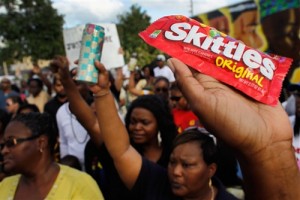 I’ve been watching a different kind of PR crisis unfold with great interest – that of Skittles.
I’ve been watching a different kind of PR crisis unfold with great interest – that of Skittles.
Skittles, you say? Taste the fruity rainbow, Skittles?
Yes, Skittles.
Because of the symbolism of the candy (Trayvon Martin was carrying only Skittles and a drink when he was shot), college student governments are buying it in bulk and reselling it to raise money for his family.
The candy has been piled into makeshift memorials, crammed into the pockets of thousands of people who have shown up at rallies in his name, and sent to the Sanford Police Department to protest the lack of an arrest in the case.
Sales are soaring for Skittles maker, Wrigley. But its new level of fame is quickly becoming a PR crisis that is threatening to hurt the company, more than it helps.
I know, I know. Sales are up. Everyone is talking about them. So what’s the problem?
According to the New York Times, people are calling for donations and giving back to communities where “murder based on stereotypes is a reoccurring theme.”
On social media sites like Twitter, people are suggesting that Wrigley is profiting greatly from the tragedy and should donate money made since Trayvon’s death to the family or causes that would help with racial reconciliation or underprivileged communities. Some African-Americans are even asking people to stop buying Skittles until the company gets more involved in the case and donates money.
So, just like we discussed yesterday where Etch A Sketch took advantage of a Romney senior aide’s gaffe and is selling more toys, Wrigley now has the opposite problem. Trayvon had Skittles in his pocket when he was killed and protestors are using the candy as a symbol for his death.
Clearly going the route of capitalizing on this opportunity is not the right thing to do. Is donating some of the increased profits the right thing to do? Is staying silent and watching it all unfold the right thing to do?
As communication professionals, we’re trained throughout our careers to deal with things such as someone dying from eating your product or someone being killed on the job. But this one? This one isn’t a case study you find very often, nor is it a scenario you typically include in your crisis management plan.
This is a crisis where “I”m sorry” doesn’t work. It’s a crisis where people on the social networks are telling you how to run your company. And, if you don’t donate money, you come off as the big, capitalist company, which could hurt you in the long-run.
Seemingly the “right” thing to do is donate money, but I’m not sure that’s the answer either.
What do you think?